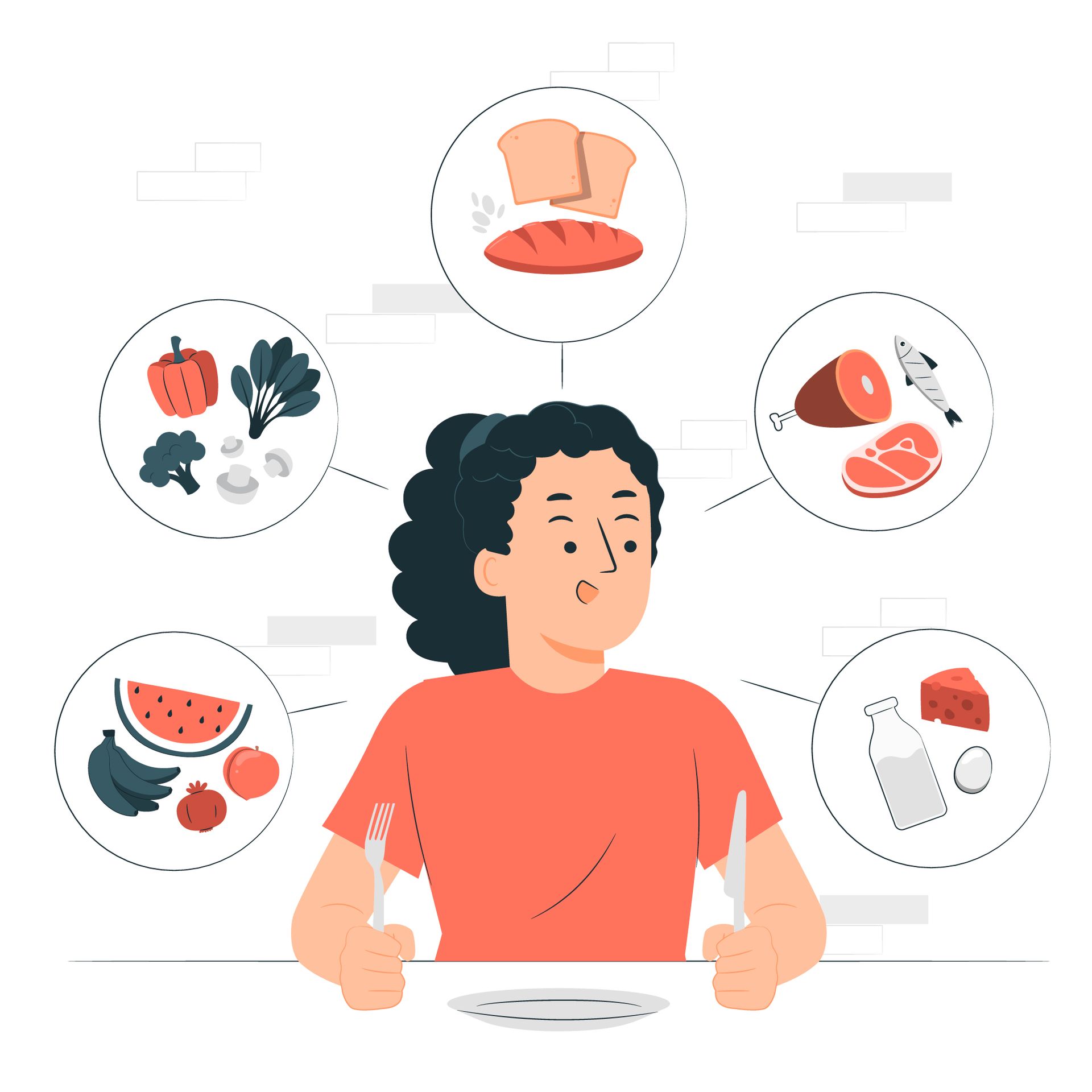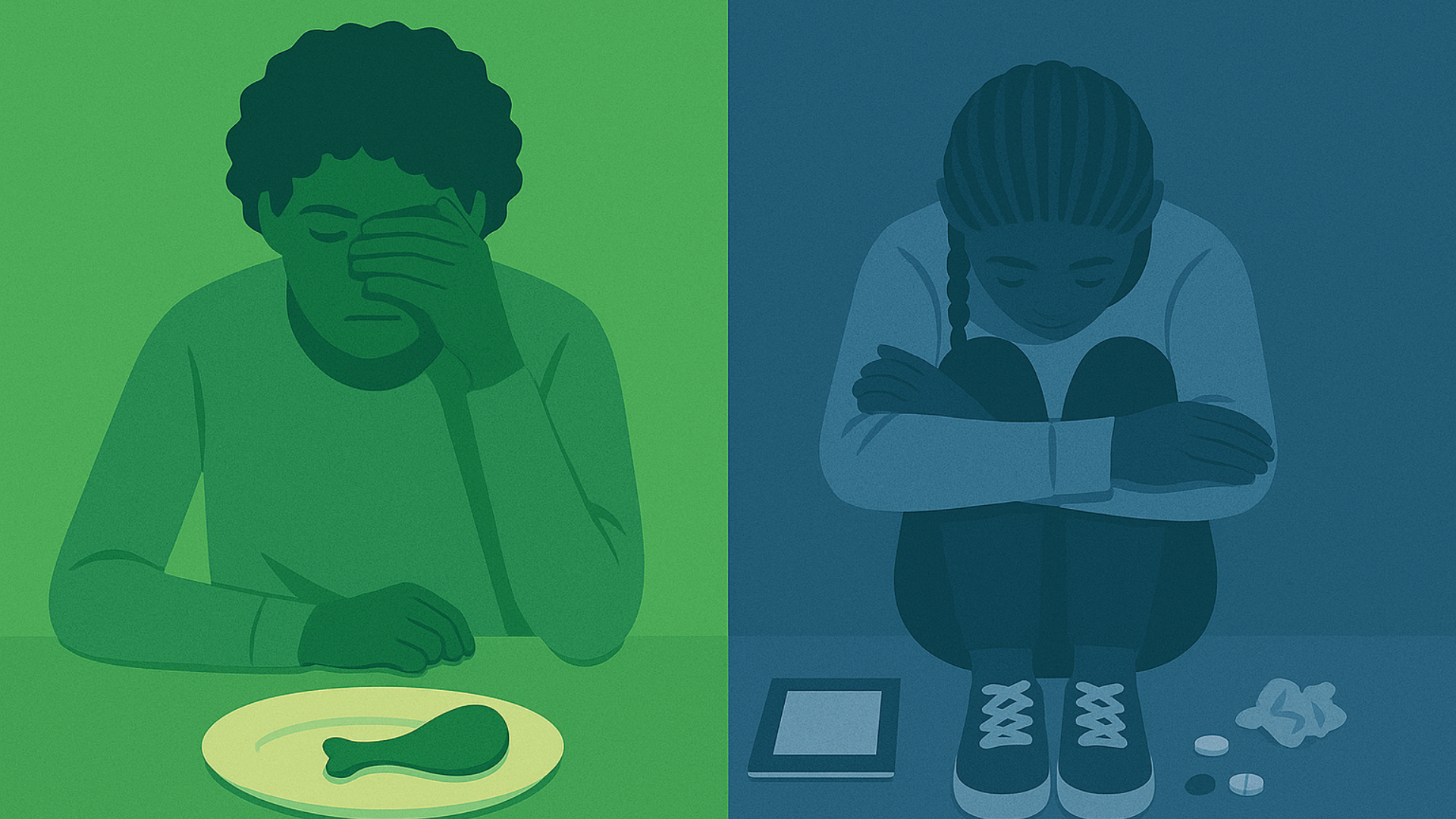Simplifying Nutrition: How Thrive’s Philosophy of Food Freedom Fosters Healing

By Thrive’s National Director of Nutrition Services Kailey Cunningham, MS, RDN, CD
While we at Thrive Wellness know nutrition rehabilitation is foundational to eating disorder recovery, we also understand there are many different approaches to nutrition that can confuse what it actually means to nourish one’s body. We’re further intimately aware that societal influences, past trauma, genetic factors, and other considerations can make it challenging for some to experience healthy relationships with their bodies and food, resulting in disordered eating behaviors and eating disorders . To overcome the many obstacles that go along with developing a more peaceful relationship with food, Thrive approaches nourishment with a flexible, gentle attitude that aims to enrich the whole person — body, mind and spirit.
A SUMMARY OF THRIVE’S NUTRITION PHILOSOPHY
At Thrive, we recognize our bodies and brains are significantly impacted by the way eating disorder behaviors affect food intake. Because we cannot heal without addressing this, nutrition support and food interactions are a key part of the recovery process. To facilitate movement away from eating disorder thinking, we embrace the inclusiveness of all foods and believe the most balanced, sustainable approach to eating excludes food judgments. We aim to help each individual develop a more peaceful, autonomous relationship with food while acknowledging the complex role food plays in our lives as well as the unique eating situations each person experiences.
Direct nutrition support is provided by registered dietitians at each level of care through education, food-related experiences, and counseling, including individualized nutrition guidance. Our ultimate goal is to empower each individual so they can truly make their own choices regarding food and nutrition with freedom from eating disorder rules, restrictions, and compulsions.
THE ROOTS OF OUR NUTRITION PHILOSOPHY
Our nutrition philosophy is rooted in three principles:
1. We can trust our bodies.
In other words, absolutely no micromanaging is necessary. Instead, we rely on our bodies and brains to provide us with accurate feedback on how best to nourish them with food and movement.
2. All foods fit.
Gone are the days of setting moral rules around pizza, broccoli, or any other kind of food. When we remove rigid guidelines around eating, we also take away the stress involved in choosing what foods to nourish our bodies with. All foods are on an even playing field.
3. All bodies are deserving of respect and compassionate care.
Thrive wholeheartedly upholds the Health at Every Size (HAES®) approach. We embrace the truths that body size doesn’t determine health, all bodies are deserving of respect and compassionate care, and people of all shapes and sizes deserve to honor themselves with compassionate care.
IMPLEMENTING OUR NUTRITION PHILOSOPHY INTO TREATMENT
Empowering Clients Through Education: An Integrated Approach
Thrive’s team of eating disorder treatment specialists work together to implement our nutrition philosophy into programming. Our registered dietitians guide clients in incorporating adequacy, balance, and choice into their eating patterns. Drawing on evidence-based nutrition knowledge, our dietitians educate clients on how to fuel their bodies in a way that feels best to them without being swayed by misleading nutrition fads or the harsh judgment typical of eating disorders . Thrive’s psychiatrists, therapists, and recovery coaches help illuminate ways that clients’ disordered eating behaviors create barriers to caring for their physical and psychological needs.
The overarching intention of Thrive’s nutrition philosophy is to simplify nutrition through education. Supported by Thrive’s experts, clients can clarify their misinformed beliefs about food, challenge disordered thinking patterns related to eating, and explore what it means to practice flexibility when it comes to nourishment.
Dismantling Diet Culture Deceptions
Clients must unlearn their misconceptions about food, body shape, and body size that have been influenced by flawed societal norms, otherwise known as diet culture . Often, this reformulation of misconceptions challenges clients to the greatest extent. Thrive’s specialists help clients understand that although the diet industry discourages them from trusting their bodies, their intuition is all they need to nourish their bodies completely.
Commonly, clients are confused about two inaccuracies propagated by diet culture — the labeling of foods as “healthy” or “unhealthy” and the validity of the body mass index (BMI) measurement.
The Healthy vs. Unhealthy Falsity
Thrive’s specialists help clients understand that food can’t be limited to the rigid categories of “healthy” and “unhealthy” or “good” and “bad”. By expanding their perspectives around their overall intake of food, individuals can appreciate that while some foods are more nutrient-dense than others, all foods do in fact nourish the body. Rather than labeling foods, individuals can begin to see all foods as options and fuel themselves with variety — adequately and consistently, of course.
Further, by not assigning moral value to food, there isn’t as much space for guilt or even self-righteousness for choosing one food instead of another. In other words, a person’s character has absolutely nothing to do with the kinds of food they eat.
The BMI Fallacy
Developed by a Belgian mathematician in the early 19th century as a way to obtain general population health data, the BMI formula is an inaccurate method that uses height and weight to assign health status.
Thrive specialists help clients grasp that the measurement is misleading for many reasons, including:
- It was developed to analyze large segments of the population for government purposes, and the creator of the BMI, Lambert Adolphe Jacques Quetelet, explicitly warned that the formula should not be applied to individuals.
- The formula fails to take into account many other measures that contribute to health, including muscle mass, bone density, and overall body composition.
- Since it uses European male bodies as a baseline, it also neglects to consider racial and gender differences.
- The index incorporates arbitrary benchmarks to define certain levels of health. These criteria were partly influenced by profit-driven pharmaceutical companies.
Reclaim Your Relationship With Food and Your Body
At Thrive, we strive to treat the entire person, which encompasses physical, mental, and emotional well-being. As we guide clients in adopting our nutrition philosophy as their own, we find that their physical and psychological symptoms subside.
When clients begin eating adequately with balance and choice, physical symptoms such as gastrointestinal upset , cold intolerance, sleep disturbances , and dizziness begin to resolve.
When a person is malnourished , their brain doesn’t have the carbohydrates necessary to function properly. So, by simply eating enough, psychological symptoms such as obsessive thoughts about food, anxiety, and depression can improve significantly.
While a nutrition philosophy can’t cure all the complexities of eating disorders , it does encourage critical progress on the recovery journey . To learn more about Thrive’s integrated therapeutic services for disordered eating and eating disorders, reach out .
About the Author
Thrive Wellness’s National Director of Nutrition Services Kailey Cunningham, MS, RDN, CD
Kailey Cunningham, MS, RDN, CD, is a Registered Dietitian Nutritionist who obtained a Master’s of Dietetics degree from the University of Kentucky after completing both her undergraduate studies in dietetics and accredited dietetic internship at the same university.
She has been a Registered Dietitian Nutritionist since February of 2013 and has been working in the eating disorder field since 2015. Kailey has experience treating clients at many levels of care, from partial hospitalization programming to outpatient, with a variety of diagnoses including anorexia nervosa, bulimia nervosa, binge eating disorder, ARFID and OSFED.
She began working at The Emily Program in Washington for three years where she acted as the full-time programming dietitian. While in this position, she worked directly with a lead therapist to develop an adolescent treatment track implementing elements of Family-Based Treatment and gaining invaluable experience working with adolescents and their parents. She then worked at Center for Discovery while building her nutrition counseling private practice. She began her successful practice in April of 2018 and moved it with her from Olympia, Washington to Rocklin, California in October 2020. Kailey is excited to now be a part of the Thrive Wellness team.
Kailey’s primary motivator and true passion is supporting others on their journey to a more peaceful and balanced relationship with food and their bodies. Through individualized nutrition counseling and education, she helps those struggling with eating disorder behaviors, body image issues, food aversion and health anxieties find what is right for them while leaving diet culture behind.
The post Simplifying Nutrition: How Thrive’s Philosophy of Food Freedom Fosters Healing first appeared on Thrive Wellness.








